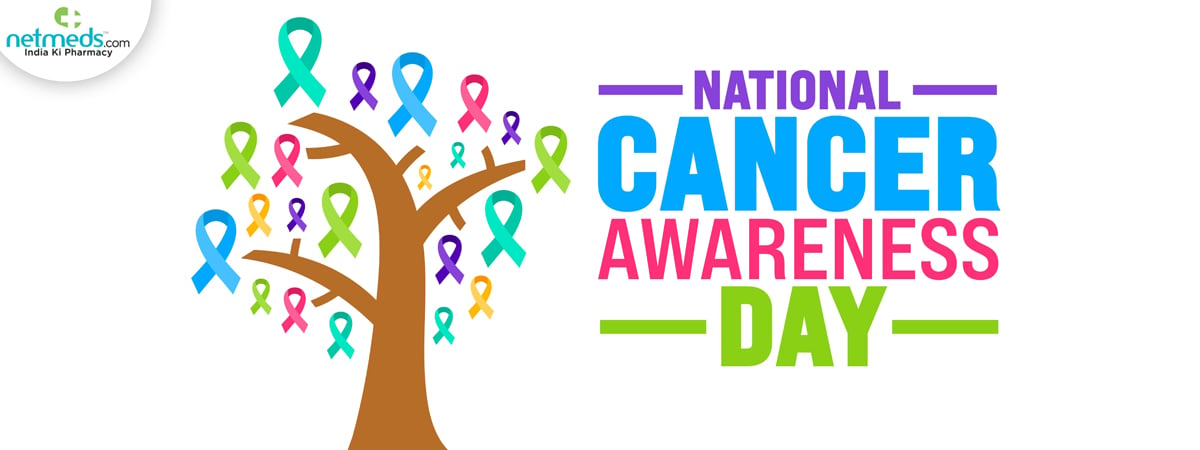National Cancer Awareness Day is observed on 7 November each year in India. This health event highlights the importance of raising awareness among the public about early detection, timely treatment and cancer prevention. National Cancer Awareness Day was first initiated in 2014 by Dr Harsh Vardhan, Indian Union Minister for Health and Family Welfare. Cancer is one of the world's most complex health challenges. If detected early, cancer could be treated effectively at a lower cost than that incurred when identified at an advanced stage.

Fight Chronic Ailments By Supplementing Your Daily Nutrition With These Multivitamins And Minerals!
Significance of National Cancer Awareness Day
This health campaign coincides with the birth anniversary of the Nobel Prize-winning scientist, Madame Curie. She is remembered for her discovery of radium and polonium, and for her immense contribution to the fight against cancer. Her work contributed to the development of nuclear energy and radiotherapy used for the treatment of cancer.
As per statistics, nearly 1.1 million new cases are being reported in India annually. Around two-thirds of cancer cases are diagnosed at an advanced stage, which decreases patients’ chances of survival. It is also estimated that one woman dies of cervical cancer every 8 minutes in India (2018). While lung and oral cavity cancers account for more than 25% cancer mortality in males, and in females, breast and oral cavity cancers account for 25%.
The main goals of this health day include:
Strategise early screening programs in urban and rural regions.
Motivating healthy lifestyle modifications and eating patterns.
Provide the right support system to cancer survivors and their families.
Mitigating social stigma and misinformation surrounding cancer.
5 High-Risk Cancers Among the Indian Population
India faces a diverse cancer burden, with certain types showing high prevalence due to genetics, lifestyle habits, and environmental factors.
Breast Cancer
Breast cancer is the most common cancer among Indian women and is high in their reproductive age. Early detection through self-examination and mammography greatly improves survival rates.
Risk factors: Family history, obesity, sedentary lifestyle, and delayed childbirth.
Oral Cancer
Oral cancer is strongly associated with tobacco chewing, smoking, and alcohol use. This type of cancer is quite common among men, especially in rural and low-income populations. Early signs like mouth ulcers or white or red patches in the tongue should never be ignored.
Cervical Cancer
Cervical cancer is cancer in the cervix, which is caused by recurrent infection with Human Papillomavirus (HPV). This cancer can be prevented at an early stage through HPV vaccination and routine Pap smear testing. It is very common among women from lower socioeconomic groups with limited healthcare access.
Lung Cancer
Lung cancer is largely associated with excessive smoking, constant exposure to air pollution, and occupational exposure (e.g., asbestos). Chronic cough, breathlessness, and unexplained weight loss are the common symptoms. Quitting smoking is the most effective preventive step.
Colorectal (Colon) Cancer
Colorectal cancer is a cancer that develops in the colon or rectum. The rising incidence of this cancer is due to overconsumption of processed and junk foods, low fiber intake, and sedentary lifestyles. Early screening through colonoscopy can help in timely detection. Regular exercise and a balanced diet rich in vegetables and fruits can reduce the risk.
Also Read: 6 Cancer-Causing Foods You Should Avoid And What to Eat Instead
Simple Measures to Reduce Cancer Risk
Though not all cancers are preventable, lifestyle choices can make a remarkable difference. Here are five practical tips for everyone:
Keep Away From Tobacco In All Forms
Smoking and chewing tobacco account for nearly one-third of cancer cases in India. Quitting today can cut your risk dramatically.
Focus On A Balanced, Antioxidant-Rich Diet
Incorporate a rich array of fruits, vegetables, whole grains, and legumes that are abundant in antioxidants and vital nutrients. Antioxidants play a key role in combating oxidative stress, easing inflammation and lowering the risk of tumour cell formation. Limit intake of red meat, processed foods, and sugary beverages.
Stay Physically Active
Get at least 30 minutes of moderate exercise daily. Regular physical activity builds a robust immune system and regulates hormones linked to cancer growth.
Regular Screenings
Early detection and prompt screening for breast, cervical, and oral cancers saves millions of lives. Seek advice from your doctor about recommended health check-ups based on your age, gender and family history.
Shield From Infections/ Pollution
Vaccination plays a vital role in cancer prevention by targeting cancer-causing viral infections. Get vaccinated against HPV and Hepatitis B. Wear masks in polluted environments and avoid prolonged exposure to industrial hazards and chemicals.
Conclusion
National Cancer Awareness Day is all about creating awareness regarding early detection and preventing lifestyle-related risk factors associated with cancer. This health campaign reminds us that with appropriate information, timely action and support, many cancers can be averted or successfully treated, thus protecting you and your loved ones.
(This article is reviewed by Kalyani Krishna, Chief Content Editor)
Author Profile:
M Sowmya Binu
With over 15 years of expertise and a Postgraduate degree in Nutrition, M Sowmya Binu is a seasoned professional in the field of nutrition. Specialising in tailoring personalised diet plans, she underscores the significance of a balanced approach to health, emphasising the integration of medication with dietary intake for holistic wellness. Passionate about equipping individuals with knowledge to make informed decisions, Sowmya adeptly develops insightful content encompassing various topics, including food, nutrition, supplements, and overall health.
References:
Cancer incidence estimates for 2022 & projection for 2025: Result from National Cancer Registry Programme, India
Krishnan Sathishkumar 1, Meesha Chaturvedi 1, Priyanka Das 1, S Stephen 1, Prashant Mathur 1,
https://pmc.ncbi.nlm.nih.gov/articles/PMC10231735/
https://gco.iarc.who.int/media/globocan/factsheets/populations/356-india-fact-sheet.pdf



 Previous
Previous